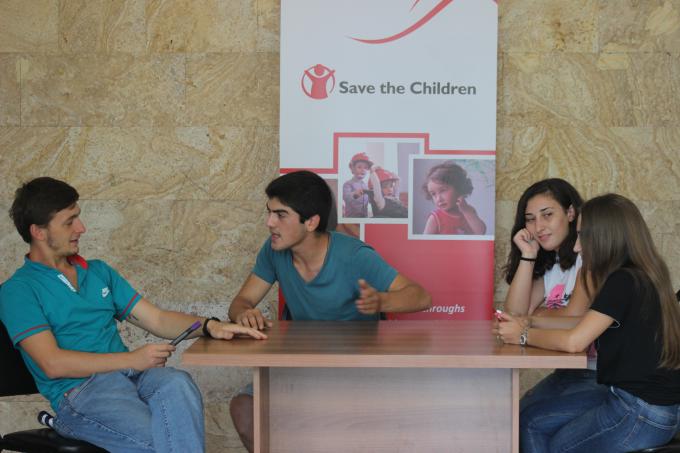Challenges in the Process of Starting a Career - a Youth Perspective
On August 23-24, 2018, Save the Children conducted an awareness-raising campaign for youth residing in Senaki municipality. The event was held as part of the two-year project “EU4Youth: Better Skills for Better Future” financed by the European Commission’s EU4Youth Program. This project aims to contribute to developing the entrepreneurial potential of disadvantaged youth; ensuring their increased access to non-formal educational opportunities for greater employability; and advocating for coherent and cross-sectorial youth policies.
Bearing in mind the aforementioned objectives, the project team decided to organize a Forum Theatre for youth from Senaki municipality to discuss the role of non-formal education in acquiring new skills and knowledge. Since the project focuses on disadvantaged youth, the SC team spared no effort to engage youth residing in the local settlement for internally displaced people that accommodates those affected by the occupation of Abkhazia in the early 1990s.
In line with the principle of Forum Theatre, event participants staged performances to discuss problems related to the selection of a profession in the absence of relevant knowledge and skills. The Forum Theatre broke through the barrier between performers and the audience, since any spectator was allowed to take the place of one of the characters, demonstrating how they would solve the problem. It enabled participants to try out courses of action, which could be applicable to their everyday lives.
The performances revealed the difficulties faced by Georgian youth in the process of planning their future lives, including the peer and parental pressure they experience in case they choose a less “prestigious” career path, lack of knowledge about existing opportunities, outdated teaching methods used in educational institutions, and having to seek essential employment skills outside of the formal educational environment. With the support of the participants, the SC team that facilitated the event discovered that in the process of selecting a profession or starting a career, youth in the region face gender discrimination within the family and society – where girls and young women are expected to start a family rather than obtain higher education, or select more “feminine” types of professions.
Participants in the event shared their fears of being unprepared for job applications after completing their studies, remaining unemployed or having to work in a field different from what they studied, and failing to acquire the necessary skills and knowledge at formal education institutions. This gloomy perspective is exacerbated by the fact that youth and professional educators are often unaware of the concept of transversal skills that proved to be one of the most important prerequisites for employment. However, as a result of the activity, the participants were able to pinpoint and use skills that will be of utmost importance to correctly choose their future career and their career success, including interpersonal communication skills, adaptability, and proactivity.
The friendly and open environment established during the event gave the participants the opportunity to self-reflect and tell stories that truly impressed the Save the Children team. One of the stories shared with the audience concerned an internally displaced young man from Ochamchire (Abkhazia, Georgia), whose parents wanted him to continue his studies at the Police Academy. Gigi’s story is not an exception, rather, it falls within the pattern of parents selecting their children’s future profession for them. He had to defend his choice to become a farmer to his parents’ dissatisfaction. Gigi was forced to apply to the local institute without telling his mother or father and disclosed his secret only when he had to get his documents from school to enroll in the program of his choice. Gigi did not tell us much about the emotional turmoil he had to endure during the last years of his schooling due to the pressure from his parents. However, the heartbroken and expressive tone in which he shared the story demonstrated the stress he had to live with.
This event was also supported by the Creative Development Centre and Heinrich Boll Foundation.
 Georgia
Georgia 